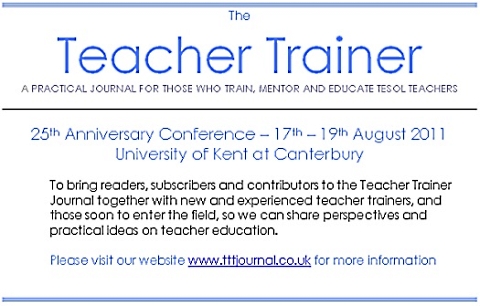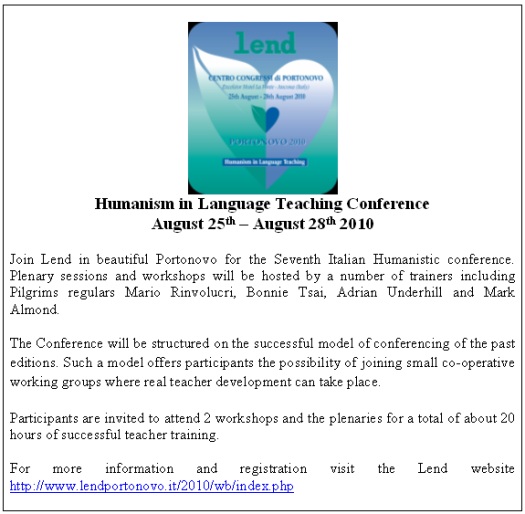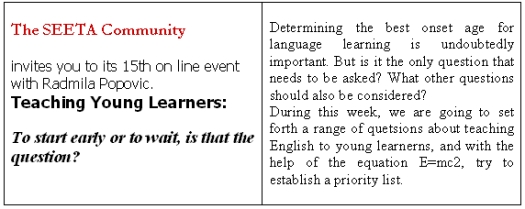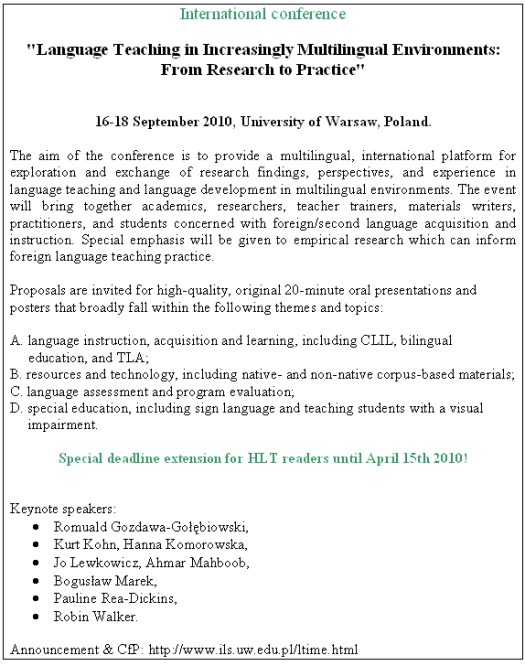Dear HLT Readers,
Welcome to the June 2010 issue of HLT. This is a special issue in which we celebrate Mario Rinvolucri’s 70th birthday. Mario among his many other achievements is the founding father of HLT. To celebrate this occasion, 58 authors form all over the world have co-written the major article: Celebrating Mario Rinvolucri. They share with us their personal perspective on Mario’s uniqueness, a man whose name has become a trademark in EFL. Seth Lindstromebrg puts in a nutshell Mario’s achievements in publishing, working as HLT editor and an animator of creative ideas:
To speak of just one aspect of his phenomenal influence, Mario has encouraged and helped more language teachers to share their ideas in print than all the UK and American publishers I know of put together.
Two further articles are devoted to some of the ideas Mario has developed: Six Mario Rinvolucri Activities No Teacher Should be Without by Lindsay Clandfield and Mario’s Lost Exercise by Paul Davis.
Mario himself has made two contributions to this issue of HLT: When E for B is Wrong for a Business Learner: A Case-study and Smile or Die - How Positive Thinking Fooled America and the World. For Mario’s earlier contributions to HLT, please click on this link.
|

In 2011, the Teacher Trainer journal will be 25 years old!!!! So we want to celebrate that quarter of a century. We hope you will join us at our:
25th Anniversary Conference
When is it? 17-19th August 2011.
Where is it? University of Kent at Canterbury, Kent, England.
Why? We want to bring together readers, subscribers and contributors to the journal with new and experienced teacher trainers plus those soon to enter the field so we can all share perspectives and practical ideas on teacher education.
Who? Speakers so far include Penny Ur, Mario Rinvolucri, Briony Beaven, Seth Lindstromberg and Tessa Woodward.
If you would like to book a place, please contact:
lizzie@pilgrims.co.uk
Background information
In case you have not come across us before, The Teacher Trainer journal will help you in your work if you are a mentor, teacher trainer, teacher educator or director of studies. Or if you are a senior or experienced teacher who sometimes has to observe language teachers and give feedback on their work or give workshops, design courses, set up resource rooms or network with teachers. It comes out three times a year and is always looking for readers, subscribers, contributors and advertisers.
The Teacher Trainer contains practical ideas that you can use in your work with teachers tomorrow, as well as thought-provoking accounts of a more long-term benefit. It's written by fellow professionals, often working in tightly prescribed circumstances and doing their very best to engage in an interesting, balanced and humane way with the teachers and students they work with. The voices of the teachers and trainers themselves are also included, as are trainer conference reports, description of useful books and articles, ideas for running sessions and making observation and feedback more fruitful, and ideas brought in from parallel fields.
The web site at www.tttjournal.co.uk is refreshed three times a year. There you can read articles from past issues as well as learning about the most recent issue (March 2010) and get information on contributing, subscribing and advertising.
The journal is edited by Tessa Woodward, a working language teacher, teacher trainer and trainer trainer. She is an author of many books and articles and often presents at conferences. She is also a Past President of IATEFL.
For further information please visit the web site at: www.tttjournal.co.uk
|
Two articles in this issue are devoted to innovative ways of teaching: Pupils' Educational Exchanges as a Tool for Promoting Global Citizenship by Roberto Ruffino and Teaching and Learning for Both the Present and the Future: 21st Century Skills and the NING Classroom by Lívia Faragó. Another innovative way that springs to my mind is e-learning. I have just completed an online course for teachers who want to use e-learning and I am full of conflicting emotions. I though it is necessary to move with the times. Clearly e-learning is a new tool which offers a lot to the teacher and learner; it is a challenge I welcome. My concern, though, is what will happen to humanism in an e-learning era. I wonder to what extent humanism is related to face to face contacts and will it survive this major change in education. Finally, I wonder to what extent this change is imposed by educational bodies who can save money and ‘overcome’ the human factor, and to what extend it is to do with the learners and teachers really wanting it. If you have any opinions on this matter please write to HLT.

The two major articles: Learning to Read: Training My ESL Learners by Chimirala Uma Maheshwari, and Challenges for Polish Learners of English from the Implementing of Learning Strategies in the National Curriculum: A Report, by Jacek Wasilewski, look at and analyse the classroom practices in their countries. There are more contributions around this theme: A Classroom Research Study on Oral Error Correction by Abdullah Coskun, Listening and Responding to Novice Teachers' Inner Voices by Bahar Gün, Evrim Üstünlüoğlu and Aynur Yürekli, Turkey, and English Methodology: Reflections on the “Exposure to Language” Principle in Teaching English and French as a Foreign Languageby Consuela Popa. They give a lot of food for thought and on one level show how certain prblems are country or/and language specific, while on another level how teachers all over the word have to deal with similar issues.
|

Dear Colleague,
We would like to inform you that IATEFL-Hungary's annual conference this year is to be held in Zánka on 8-10 October 2010. The motto of the event will be *"Standing Out or Being Outstanding" Exploring new normalities in the classroom.*
**To give you an idea of what an IATEFL-Hungary conference is like, please,
take a look at the video www.youtube.com/watch?v=8EGq2P8SQwo made
at last year's conference in Budapest.
The *deadline for submitting speaker proposals is **31st March 2010.* The deadline for *early bird registration is extended this year till **30th June 2010*. Please find all conference documents on our website www.iatefl.hu
We hope that the extended early bird registration date will allow you enough time to consider attending our 20th annual conference as a presenter or as a participant in October in Zánka, and that we shall be able to welcome you among our members in the association.
With very best wishes,
The Committee of IATEFL-Hungary
|
In this issue you will also find a number of articles on the sensory input and the role of senses in teaching and learning: Making Sense of Your Senses by Danny Singh, The Heart of the Matter: When the Senses Don’t Make Sense. Adventures in Non-verbal Communication, by Lou Spaventa, and Synesthesia and the Language Classroom – Using Personalised Colour Schemes for Language Learning by Michele Bachmann,
As usual there are many practical ideas for your lessons. In Word Clouds by Hanna Kryszewska you can make friends with a nice little programme available on the Web. It has potentially many uses in a language class. Carme Porcel gives ample ideas on using film snippets in class in her article: Learning English Through Films. There are also many ideas for the creative classroom in Revising and Consolidating Vocabulary Through Multiple Intelligences by Anila R. Scott-Monkhouse and Hyo-jeong (Leona) Hur, Lateral Thinking and Language Learning Activity Design by Simon Mumford and A Lesson on Product Origins for Global Education by Alice Svendson.
If you would like to find out about a few developments in the publishing world in the general sense of the term ( including web publications), don’t miss: The Laughnlearn Website by Danny Singh, CD III - Just a Few General Notes by Karl Preis and Fiction in Action: Whodunit by Marcos Benevides.

If you would like to know what can happen when a language teacher travels for work, I am sure you will enjoy the reflections in: The Calling: An Overseas Course of Study or a Pilgrimage? by Michael Berman, and Putting One’s Feet Up Without A Permission by Robin Usher.
For your entertainment there is some humour in : If I Were an English Teacher I Would Try to Do Something with Some of These, submitted by Cécile Marit, and some poems: Three Poems by Michael Berman, and New Poems by Annamaria Mandoliti.

As I write this summer is coming and we are getting ready for our summer at Pilgrims in Canterbury. We hope to meet you there, if not this year then in the nearest future. Two articles give you a glimpse of what teachers experience when they come to Pilgrims: NLP for Teachers: Outside School. Part 3 by Bonnie Tsai and A New Experience - Spatializing Language on a Walk around Canterbury by Rosie Norman. Alternatively, if you cannot come to Pilgrims, Pilgrims can come to you. In Course Outline: Pilgrims Overseas Workshops you can find out what to do and whom to contact to invite Pilgrims trainers to your school, town or country.
I hope you will enjoy this issue
Hania Kryszewska
HLT Editor
hania.kryszewska@pilgrims.co.uk



|